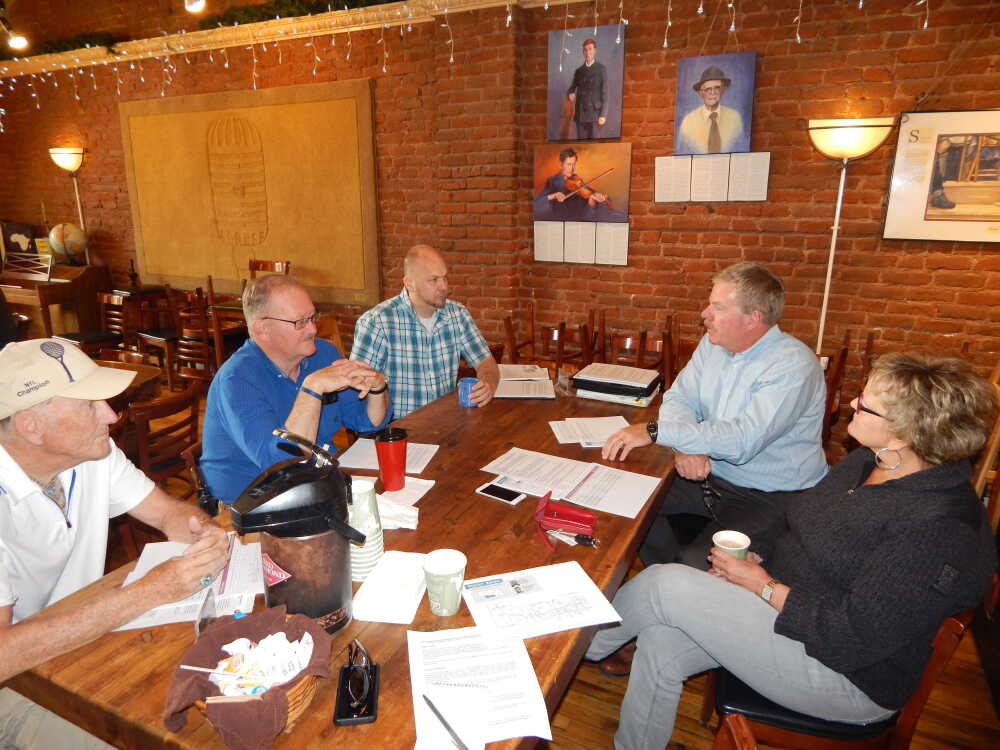State concludes rumble bars save lives; will be part of new projects

McCOOK, Neb. — Rumble bars have proven to be an effective life saver in Nebraska and will be a part of most roadway improvement projects going forward.
The Department of Roads reviewed three years worth of historical data for the first large-scale implementation, which centered around shoulder rumble strips installed on the entire length of rural I-80, and determined that segment alone saved six lives per year on average. Plans are in place to include them on any future projects which have at least a two-foot shoulder and hundreds of additional miles have already been installed, according to District Engineer Kurt Vosburg.
During Tuesday’s Coffee with a Cop meeting at the Bieroc Cafe, Vosburg also said center-lane rumble bars would be installed on roadways where a pattern of cross-traffic collisions had been identified.
“We don’t just think they save lives, we know they do and it’s amazingly cheap,” said Vosburg. Installing rumble bars cost approximately $1,000 per mile, which totals roughly $8,000 on a $3-4 million project.
Vosburg recapped current and upcoming road improvement projects in the region during the casual format meeting, in addition to providing his take on a variety of topics, including a recent departmental consolidation announcement. State lawmakers approved Gov. Pete Ricketts’ plan to merge the Department of Roads and Department of Aeronautics into a new Department of Transportation roughly two weeks ago. The measure received final reading approval on a 47-0 vote and is effective July 1.
Vosburg said he thought it was a great idea and excitement was already building for some of the savings it would provide. He said the Department of Aeronautics, for example, utilized a walk behind striping machine to service its airports. A recent demonstration indicated the Department of Roads’ striping equipment would reduce what is currently an all-day job for one person down to 45 minutes.
“We’re looking forward to it,” said Vosburg.
The legislation is also very specific about maintaining a division of aeronautics within the new Department of Transportation, according to Vosburg. “And rather than report to a deputy director like the other divisions, aeronautics will report directly to the Director of the Department of Roads. To ensure aeronautics gets a fair shake and to keep funds protected,” he said.
“We are the last Department of Roads in the country,” Vosburg said with a chuckle, adding the title always led to a few friendly jokes from counterparts in other states.
Equipment mobilization costs are often a contributing factor when local contractors are outbid by those from out-of-the-area. Vosburg said it costs approximately $250,000 to mobilize asphalt equipment to a site, for example, and if an out-of-area contractor already has equipment in the region when a new project is put up for bid, he will have a significant advantage over contractors that might be headquartered closer to the project.
This summer’s roadway projects in the area include a 7.9-mile resurfacing project starting a half-mile north of McCook, which is slated to begin in late summer or early fall. Flaggers and a pilot vehicle will be used for the project.
A 7.6-mile resurfacing project east of Ragan is similarly expected to begin in late summer and be completed in November. Flaggers and a pilot vehicle will also be used.
Work is already underway on a 6.5-mile improvement project near Southern Valley School and includes replacing three narrow, aging bridges with large concrete box culverts, in addition repairing and resurfacing a fourth bridge. An abandoned rail crossing on the Nebraska Kansas Colorado Railnet Oberlin line will also be removed. Paving is expected to begin later this month with the entire project completed by fall.
Bridge work is expected to begin next week on a 11.4-mile resurfacing project on U.S. 283 south of Arapahoe. Minor repair work is planned on the Republican River and Muddy Creek bridges as part of the project, with all work completed later this year. Flaggers and a pilot vehicle will be utilized.
